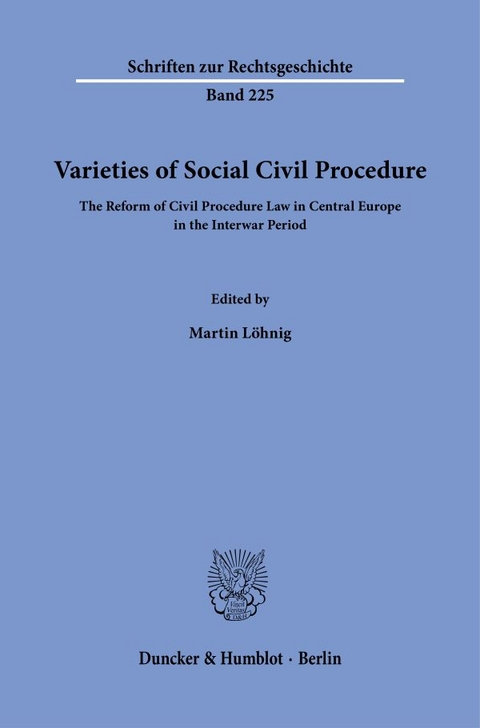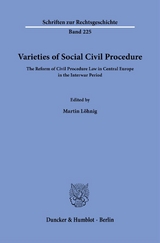Varieties of Social Civil Procedure
The Reform of Civil Procedure Law in Central Europe in the Interwar Period
Seiten
Two very different models were available after 1918: On the one hand, there was the liberal German ›Reichszivilprozessordnung‹ of 1877, on the other hand, there was the Austrian ›Zivilprozeßordnung‹ of 1895, which established the model of social civil procedure. All new Central European countries have embarked on the path towards a social civil process and have broken with the liberal tradition, albeit in very different ways.
After the collapse of the state structure in the centre of Europe as a result of the »Great War«, the new nation states often initially adopted the law that had previously applied on their territory. However, they soon sought to create their own legal order by enacting codifications in the central areas of law. The standardisation of national court constitutions and procedural law played a central role in this. Two very different models were available. On the one hand, there was the liberal German ›Reichszivilprozessordnung‹ of 1877, on the other hand, there was the Austrian ›Zivilprozeßordnung‹ of 1895, which established the model of social civil procedure. It was not intended to be a code for Rudolf Ihering’s »struggle for justice«, but to serve »as a state welfare institution« (Franz Klein) and a means of social policy. All Central European countries have embarked on the path towards a social civil process and have broken with the liberal tradition, albeit in very different ways. After the collapse of the state structure in the centre of Europe as a result of the »Great War«, the new nation states often initially adopted the law that had previously applied on their territory. However, they soon sought to create their own legal order by enacting codifications in the central areas of law. The standardisation of national court constitutions and procedural law played a central role in this. Two very different models were available. On the one hand, there was the liberal German ›Reichszivilprozessordnung‹ of 1877, on the other hand, there was the Austrian ›Zivilprozeßordnung‹ of 1895, which established the model of social civil procedure. It was not intended to be a code for Rudolf Ihering’s »struggle for justice«, but to serve »as a state welfare institution« (Franz Klein) and a means of social policy. All Central European countries have embarked on the path towards a social civil process and have broken with the liberal tradition, albeit in very different ways.
After the collapse of the state structure in the centre of Europe as a result of the »Great War«, the new nation states often initially adopted the law that had previously applied on their territory. However, they soon sought to create their own legal order by enacting codifications in the central areas of law. The standardisation of national court constitutions and procedural law played a central role in this. Two very different models were available. On the one hand, there was the liberal German ›Reichszivilprozessordnung‹ of 1877, on the other hand, there was the Austrian ›Zivilprozeßordnung‹ of 1895, which established the model of social civil procedure. It was not intended to be a code for Rudolf Ihering’s »struggle for justice«, but to serve »as a state welfare institution« (Franz Klein) and a means of social policy. All Central European countries have embarked on the path towards a social civil process and have broken with the liberal tradition, albeit in very different ways. After the collapse of the state structure in the centre of Europe as a result of the »Great War«, the new nation states often initially adopted the law that had previously applied on their territory. However, they soon sought to create their own legal order by enacting codifications in the central areas of law. The standardisation of national court constitutions and procedural law played a central role in this. Two very different models were available. On the one hand, there was the liberal German ›Reichszivilprozessordnung‹ of 1877, on the other hand, there was the Austrian ›Zivilprozeßordnung‹ of 1895, which established the model of social civil procedure. It was not intended to be a code for Rudolf Ihering’s »struggle for justice«, but to serve »as a state welfare institution« (Franz Klein) and a means of social policy. All Central European countries have embarked on the path towards a social civil process and have broken with the liberal tradition, albeit in very different ways.
Martin Löhnig
Battle Rule or Welfare Institution? German Civil Procedure Law in the Interwar Period
Kamila Staudigl-Ciechowicz
Civil Procedure Law in Austria in the Interwar Period
Eszter Cs. Herger
In the Service of »Truth«. Civil Procedure Law in Hungary in the Interwar Period
Anna Stawarska-Rippel
The Phenomenon of Departing from Legal Solutions of Expert Bodies in the Legislative Process – the Polish Interwar Experience. Historical or Current Dilemmas?
Petra Skřejpková
The Development of Civil Procedure in the Interwar Period
Mirela Krešić and Dunja Milotić
Civil Procedure Law in Central Europe. Kingdom of Serbs, Croats and Slovenes/Yugoslavia (1918–1941)
Bibliography
List of Authors
| Erscheinungsdatum | 27.11.2024 |
|---|---|
| Reihe/Serie | Schriften zur Rechtsgeschichte ; 225 |
| Zusatzinfo | 1 Tab., 2 Abb. (darunter 1 farbige); 168 S., 1 schw.-w. Abb., 1 farb. Abb., 1 schw.-w. Tab. |
| Verlagsort | Berlin |
| Sprache | englisch |
| Maße | 157 x 233 mm |
| Gewicht | 295 g |
| Themenwelt | Geschichte ► Teilgebiete der Geschichte ► Militärgeschichte |
| Recht / Steuern ► Allgemeines / Lexika | |
| Recht / Steuern ► Privatrecht / Bürgerliches Recht ► Zivilverfahrensrecht | |
| Recht / Steuern ► Rechtsgeschichte | |
| Schlagworte | austria • Central Europe • czechoslovakia • Hungary • Mitteleuropa • Poland • Yugoslavia • Zivilprozessordnung • Zivilverfahren |
| ISBN-10 | 3-428-19210-9 / 3428192109 |
| ISBN-13 | 978-3-428-19210-6 / 9783428192106 |
| Zustand | Neuware |
| Informationen gemäß Produktsicherheitsverordnung (GPSR) | |
| Haben Sie eine Frage zum Produkt? |
Mehr entdecken
aus dem Bereich
aus dem Bereich
neueste Manipulationstechniken als Waffengattung der NATO
Buch | Softcover (2023)
Westend (Verlag)
24,00 €
Deutschlands Schwäche in der Zeitenwende
Buch | Softcover (2023)
C.H.Beck (Verlag)
18,00 €




